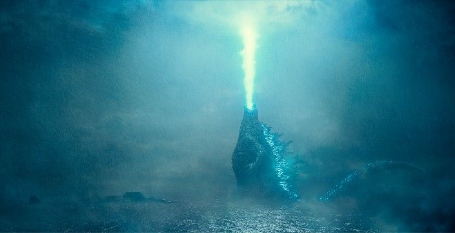The dark god of destruction could be the monster mayhem we need right now.
The iconic character of Godzilla first appeared in a 1954 film by Ishirō Honda. Originally created to represent the destructive power of nuclear weapons, Godzilla has been likened to a Shinto God of Destruction - destroying everything so that there can be a rebirth, so that something new and fresh can begin.
Unsurprisingly - given his reptile gene pool - Godzilla's gender has been shown to be a bit fluid, which probably also goes for the ancient giant's sexuality. Godzilla doesn't play by anyone else's rules - this is someone who defies convention and is creating their own path in life. Can we claim Godzilla as a gay icon? It could be a bit of a stretch, but not beyond the realms of possibility.
Godzilla has recently been back on the big screen in Godzilla: King of the Monsters (2019) which is the latest instalment in the MonsterVerse franchise produced by Legendary Entertainment and Warner Bros. The next film to be released will be Godzilla vs. Kong - it was originally scheduled to release in March 2020, but that's now been pushed back to November 2020.
The Godzilla chapters in the MonsterVerse franchise have pretty much been savaged by the critics. While the narrative that connects this universe - and even the story arc of each film - doesn't make much sense, there is a perverse thrill to seeing your city, and cities that you know, being wilfully torn apart by a rampaging monster.
Beyond the adrenaline rush of seeing things demolished, the unleashing of the God of Destruction feels quite timely - we seem to be at a point where everything that we thought we knew now feels as if it’s unravelling.
It’s sometimes hard to wrap your head around where the world is going, and where we’re at right now. The geo-political landscape is shifting so quickly. The principles by which our world operates no longer seem to have such firm foundations. It seems that each day we wake in trepidation of what new unexpected twist we need to grapple with.
Is this the beginning of the end? Or is it just a new beginning. You could do a lot worse than sitting in a dark room for a couple of hours, watching unimaginable monsters wilfully destroying the world and each other. Somehow, that’s less frightening than real life.
The iconic character of Godzilla first appeared in a 1954 film by Ishirō Honda. Originally created to represent the destructive power of nuclear weapons, Godzilla has been likened to a Shinto God of Destruction - destroying everything so that there can be a rebirth, so that something new and fresh can begin.
Unsurprisingly - given his reptile gene pool - Godzilla's gender has been shown to be a bit fluid, which probably also goes for the ancient giant's sexuality. Godzilla doesn't play by anyone else's rules - this is someone who defies convention and is creating their own path in life. Can we claim Godzilla as a queer icon? It could be a bit of a stretch, but not beyond the realms of possibility.
From the iconic B-movie crowd-pleasers, to the big budget Monsterverse outings of recent productions, there is a perverse thrill to seeing your city, and cities that you know, being wilfully torn apart by a rampaging monster.
Beyond the adrenaline rush of seeing things demolished, the unleashing of the God of Destruction feels quite timely - we seem to be at a point where everything that we thought we knew now feels as if it’s unravelling.
It’s sometimes hard to wrap your head around where the world is going, and where we’re at right now. The geo-political landscape is shifting so quickly. The principles by which our world operates no longer seem to have such firm foundations. It seems that each day we wake in trepidation of what new unexpected twist we need to grapple with.
Is this the beginning of the end? Or is it just a new beginning. You could do a lot worse than sitting in a dark room for a couple of hours, watching unimaginable monsters wilfully destroying the world and each other. Somehow, that’s less frightening than real life.












 列印版本
列印版本




















讀者回應
搶先發表第一個回應吧!
請先登入再使用此功能。